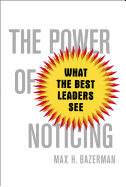Jack Covert Selects - The Power of Noticing
August 15, 2014
No matter how smart we are, if we don’t train ourselves to notice what is not immediately in front of us, then we cannot make the best decisions.

The Power of Noticing: What the Best Leaders See by Max H. Bazerman, Simon and Schuster, Hardcover, 215 pages, 9781476700298
Sandusky. Madoff. Enron. Hurricane Katrina. These are well-publicized examples of our failure to notice impending disaster. In his new book, The Power of Noticing, Max Bazerman expounds on these tales to reveal how we might learn from them in order to prevent similar calamities. As he says, “Understanding what is at work when we fail to notice is crucial to understand how we can learn to pay attention to what we’re missing.”
In fact, in the worst cases, we make decisions that are unethical because we think we are limited to the better of two bad options.
I was beginning to realize that there was a serious gap in my understanding of human decision-making failures, a gap that also existed in the scientific and managerial literature on decision making. It was becoming increasingly clear to me that terrible things happen when our leaders fail to think about data that are outside their typical focus.
Holding himself and everyone else to a high standard, Bazerman asserts that improving our ability to notice is a social responsibility.
Typically we ignore the growing data or simply decide that we lack sufficient evidence to badger other people for more information that could reveal the truth. Through our silence and complacency we accept and promote corruption.
Beyond the disaster stories, what actually stands out in Bazerman’s book is his willingness to use his life as anecdotal evidence of his thesis: no matter how smart we are, if we don’t train ourselves to notice what is not immediately in front of us, then we cannot make the best decisions. As such, there is a refreshing biographical element to this book that aids in helping us understand our own failures of prognostication.
Most people put a high value on developing an ability to focus, but Bazerman explains that being focused can actually work against you, and “periodically we focusers should take a break, remove our blinders, and notice all the valuable information around us.” Our inattention can be deliberately used against us—think of skilled pick-pockets, or clever magicians, or even… effective salespeople—and misdirection or deliberate distraction is frequently deployed during high-stakes negotiations. This can be avoided, Bazerman explains, if you learn to look through your opponent’s eyes for his or her motivations and desired end result. The Power of Noticing, with its interesting mix of social science and leadership, is one of those books that will encourage and instruct you to make small changes in your awareness that will lead to big changes in the way you understand and interact with the world.


